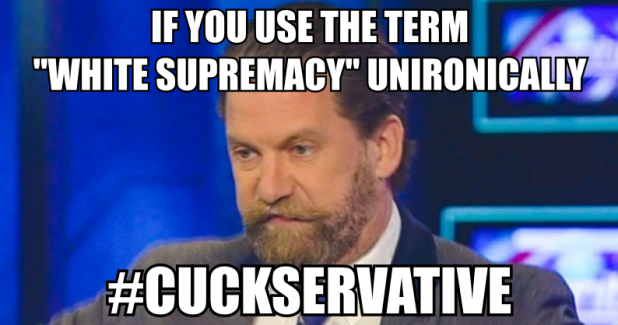The Right Stuff
October 24, 2015
“Cuckservative” was one of the alt-right’s biggest successes in a long time. A slur tossed about by anonymous edgelords on Twitter and other forums was written about in the print edition of the New York Times (circulation: 1.5 million), mentioned on television, and stands a very good chance of becoming a permanent part of our political lexicon. So what, then, can we learn from it? Let’s look at its origins.
The very first usage of the word “cuckservative” comes from /pol/, where it was used independently by different by posters starting from September 2014.
Around February of 2015, the neoreactionary community developed the idea of “conservakin”, a related concept that lacked the sexual (and racial) connotations of “cuckservative” but correctly pointed out the tendency of mainstream conservatives to cuck for Israel and fail impotently to stop the left.
On April 3rd, the Twitter account @cuckservative was created, and helped push the alt-right to begin attacking cuckservatives en masse.
Later, on July 15, Alfred W Clark published an article giving a clear definition of “cuckservative”. With this, usage of the term on Twitter skyrocketed. On July 22, Rush Limbaugh attacked “cuckolded Republicans” on his radio show, a usage that was extremely similar to “cuckservative” but almost certainly accidental. Crucially, however, this usage provided low-quality journalists with an apparent example of the phrase’s popularity. Soon after, EW Erickson attacked the term on Twitter to all of his 100K+ followers, becoming the first public figure to take note of the word. Shortly after, he was swarmed by alt-right trolls, the cuckservatives Matt K. Lewis and Tommy Christopher hit their keyboards to produce articles deriding the term, and the snowball was started. But what can we take away from #cuckservative?
First, mass movements are overrated and individuals matter. #Cuckservative was from the beginning astroturfed, pushed by a small number of highly dedicated individuals backed by a small number of article writers and meme creators. Popular movements are overvalued – we only need a few hundred people, at most, to affect the course of public policy. Our problem is one of coordination, not numbers. The alt-right, helped by sympathetic voices like Mike Cernovich and crypto-race realists like Katie McHugh, has enough people right now to enter the mainstream.
Second, #cuckservative revealed the ideal level of edginess. Obviously, opinions inside the Overton window are useless, while Ben Garrison levels of hatred will simply get us ignored and shunned. #Cuckservative evidently hit a sweet spot, presenting a message that was usually but not invariably racial in nature. This put us in a position where people would listen to our message instead of rejecting it out of hand. Going forwards, we should strive for this level of edginess: probably racially aware, but with plausible deniability.
Next, cuckservative revealed weak links in the media’s armor. Trying to reach major political figures and celebrities directly is highly unlikely to succeed. However, a great many journalists, GOP insiders, editors, and other people with soft power use Twitter, and many of them have very low follower counts, making it highly likely that they will read or respond to our tweets (or email, if that’s your thing). These people are the chink in the armor of the GOP establishment, since many of them are not yet inured to public criticism and attack. Although finding them is difficult, a good start is simply to look up any journalist you read, any GOP consultant whose name you hear mentioned in the media, and the editors of prominent news sites. Multiple National Review editors, for instance, took note of #NRORevolt. These are the people we need to reach.
Finally, cuckservative emphasized the importance of slurs in enacting change. Politics nowadays consists of little more than establishing that a word is bad and then applying that term to your enemies. The Left calls mainstream conservatives bigots, racists, and homophobes, while the right calls the left hippies and commies – and now, we can call out cuckservatives too. Although using slurs is obviously not how we would like public policy to be formed, we need to accept the reality of the world we live in. Slurs work, and we should continue to use them in the future.
 Daily Stormer The Most Censored Publication in History
Daily Stormer The Most Censored Publication in History



